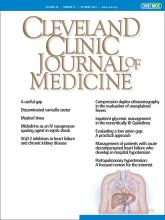To the Editor: In the July issue, Drs. Manos and Short1 presented a new model through which to treat and determine efficacy of treatment for adult ADHD. I’d like to thank the authors for sharing a fresh lens into the clinical practice of this disorder. Their emphasis on using task completion as the unit of measurement in determining effectiveness of treatment, as well as strategies to write out a formal plan through which to delegate and complete tasks, was of note. I’d like to offer two suggestions.
First, while stimulants are widely regarded as the first-line treatment for adult ADHD,2 I’d be remiss not to bring non-stimulant dopaminergics, such as atomoxetine and bupropion, into the conversation. In one study, only standard-dose atomoxetine resulted in moderate significant improvements vs placebo when assessing individual ADHD pharmacotherapies as a continuous measure,2 while in another study, bupropion was found to significantly decrease ADHD rating scales by greater than or equal to 30% compared with placebo.3 I believe these agents should also be considered prime candidates for the treatment of adult ADHD, especially for patients who tolerate amphetamines poorly or are at high risk for developing or relapsing into a substance use disorder.2
The recommendation of social scaffolding assumes the patient has access to the same variety of conveniences afforded to the likes of business executives with assistants and administrative offices tailoring their daily lives. A more accessible avenue for accountability would be to engage regularly with peer support groups. Peer support benefits include increased self-efficacy, enhanced coping strategies, and reduced social isolation.4 A meta-analysis of 28 randomized controlled trials showed peer support outcomes for a range of mental illnesses significantly improved measures of psychiatric symptoms and measures of personal agency, self-esteem, and self-management of difficulties.5
- Copyright © 2023 The Cleveland Clinic Foundation. All Rights Reserved.






